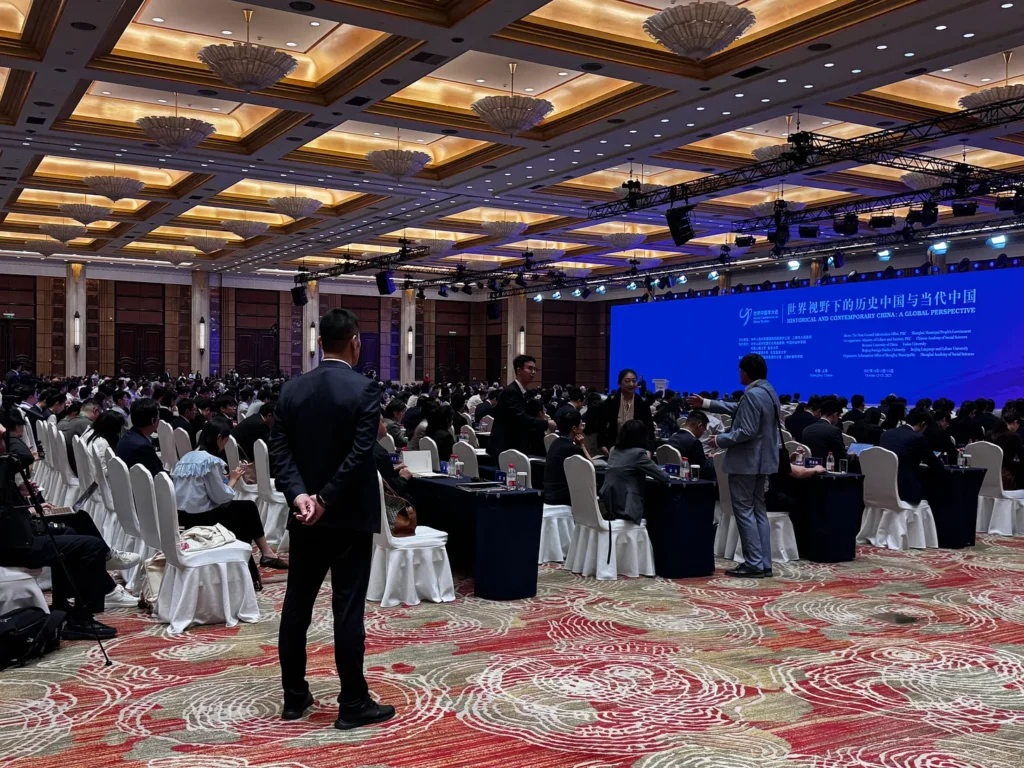Two Conferences in Shanghai: Reflections on Discourse, Dialogue, and the Non-Studies of Peace
TRANSCEND MEMBERS, 27 Oct 2025
Jan Oberg, Ph.D. | Transnational Foundation – TRANSCEND Media Service
24 Oct 2025 – In October 2025, I attended two major academic conferences in Shanghai—both by invitation, and, curiously, as the only scholar from Scandinavia. That absence felt unjust to the more experienced Nordic experts in China studies who deserve a seat at such global forums.
What unfolded was a journey through two distinct but interwoven events—each offering a lens into China’s intellectual landscape and its evolving role in the world.
The 2nd World Conference on China Studies
The first event, the 2nd World Conference on China Studies, brought together over 500 scholars from 50 countries under the theme “Historical and Contemporary China: A Global Perspective.” I participated in the sub-forum titled “China in Global Context: Continuity and Innovation of Civilisation.”
It was a masterfully orchestrated gathering. The Chinese hosts demonstrated remarkable professionalism—from travel logistics and hotel arrangements to meals, sub-forum coordination, and sightseeing. The venue, Shanghai International Convention Centre in Pudong, stood beside the monumental new Museum of Contemporary Art and the iconic tower that defines the skyline when viewed from Nanjing Road across the river.
This high-level event was jointly hosted by the State Council Information Office of China and the Shanghai Municipal People’s Government, and organised by the Shanghai Academy of Social Sciences. Support came from a constellation of institutions: the Ministry of Culture and Tourism, Chinese Academy of Social Sciences, Renmin University, Fudan University, Beijing Foreign Studies University, and Beijing Language and Culture University.
The Opening Ceremony was chaired by Mo Gaoyi, deputy head of the CPC Central Committee’s Publicity Department and Minister of the State Council Information Office. A keynote was delivered by Romano Prodi, former Italian Prime Minister and President of the EU Commission—still deeply respected in China and a vocal advocate for global cooperation. (One wonders how he views today’s EU leadership.)
Other distinguished speakers included Gao Xiang, President of the Chinese Academy of Social Sciences, and long-time China scholars like Sally K. Church of the Needham Research Institute and Martin Jacques, known for his decades of engagement with China and his widely viewed TED and other video talks.
My Sub-Forum and Lecture
I gave a lecture in the sub-forum led by Professor Zhang Weiwei, head of the China Institute at Fudan University, who also hosted the second conference marking the institute’s 10th anniversary. A few of us participated in both events, creating a sense of continuity and deepening dialogue.
Such huge top-level or “high-end” conferences also attract the media, all the local Shanghai media and all the national media, no exception. They want to hear what you think about China and its development, a bit as if they feel they need some Westerners to confirm their own historically unique and very positive human-centered achievements over the last 40 or so years. They certainly don’t – but the admiration of the West and the elements of “imports” from the West still have a role to play.
I can’t remember anybody in Western media showing any interest in asking Chinese social science experts what they thought about the development of the West.
Most of these media people are young, say 25-35. They rush up to you and sometimes even before presenting themselves or what they want to ask you about, put up their microphone and begin asking questions. At a robotics research centre, where we walked among humanoid robots, several of them wanted to know my views on these new creatures. I took the opportunity to say that an expert is only an expert in specific fields.
I then made the general point that all societies need to thoroughly discuss the good and bad sides of all new technologies and make democratic decisions about their implementation, or risk that technology runs away with society and human joys and creates more new problems than contributing to solving older ones.
That was actually spontaneously appreciated by several of the 10-15 interviewers I was approached by on that single day.
The third type of question was what such an international conference could contribute to.
My general response was that while such conferences often do not permit deep dialogues because most forums are time-tight and scheduled to have only presentations of a few minutes and little or no answers from the audience, that part may have limited effect in and of itself – but that, of course, human beings meet also outside over meals and coffees, make new contacts, exchange informal views, point each other to interesting analyses and views, etc – they can be very useful.
In addition, science, like art, I emphasised, can be a great bridge-builder among civilisations: “This is how you think about it and this is how we, or I, think about – now let’s see what is compatible and what needs to be worked on!”
Actually, this type of social cosmology, or deeper ways of thinking, was the theme of my own 8-minute mini-lecture. And it was quite well received in spite of the more geopolitical focus that many other participants adhered to.
It is based on my chapter of the TFF anthology, “If You Want To Understand China.”
In my sub-forum, I was particularly happy with what I heard Vuk Jeremic from Serbia, Carlos Martinez, Martin Jaques and Richard Sakwa from the UK, Valentin Golovachev from Russia, Fan Yongpeng, Huang Renwei and Zhang Weiwei from China had to say – whereas Gideon Rachman, chief foreign affairs commentator of the Financial Times, was a fine representative of the outdated pro-armament mainstream geo-political paradigm in which Russia appears as a never-ending threat to Europe that NATO must re-arm to defend itself.
The Thinkers Forum 2025: Discourse and Destiny
The second conference, the Thinkers Forum 2025 on Chinese Discourse and the Reshaping of World Order, unfolded on the breathtaking campus of Fudan University—one of China’s most prestigious institutions, ranked among the top in Asia and globally.
At the heart of this gathering was Professor Zhang Weiwei, who has led Fudan’s China Institute with remarkable vision over its first decade. More than a scholar, Zhang is a connector—surrounded by young thinkers, deeply engaged with media, and constantly on the move to build bridges across continents. He often travels with a film crew from the media platform China Academy, capturing dialogues that transcend borders.
I first met him in 2024 in Skopje, at a forward-looking conference on globalisation and world order hosted by Professor Biljana Vankovska, TFF board member. It was there that he invited me to record a video conversation—one that marked the beginning of a stimulating intellectual exchange.
Zhang has pioneered what he calls “futurist historiography”—a method of projecting the likely evolution of unfolding events. In a recent retrospective titled “Our Strategic Predictions Are Quite Accurate,” he did something rare in academic circles: he revisited past forecasts the Institute had made and showed how many had come to pass.
I found this both refreshing and necessary. After all, if your predictions prove accurate, why not say so? As with medicine, sound diagnosis and prognosis lead to better treatment. The same holds true for political analysis.
Rethinking Security: A Call for Peace Literacy
In my own remarks, I reflected on a troubling global pattern: despite vast cultural differences, most nations still approach security through the same narrow lens—weaponised ‘security’ before peace, deterrence before dialogue. The prevailing doctrine of offensive defence remains dominant, despite its outdated assumptions and conspicuous destabilising consequences.
This mindset accepts violence—even mass killing—as a necessary fallback if deterrence fails. It sidelines Article 1 of the UN Charter, which mandates that peace be pursued by peaceful means. It neglects alternative strategies like civil defence, vulnerability reduction, and resilience-building. And it reveals a profound absence of education in conflict resolution, mediation, reconciliation, and forgiveness—displaying what I call “conflict and peace illiteracy.”
I didn’t need to spell out that nuclear weapons and the ideology I call nuclearism have no place in a truly peaceful world. My references to Gandhi, Martin Luther King Jr., and China’s own Sun Tzu—whose wisdom dates back over 2,300 years—were intended to make that clear.
In my brief eight-minute slot, I devoted one minute to alternative security paradigms, and another to urging Chinese academia to embrace peace and conflict studies, as well as future studies, as formal disciplines. While individual scholars here and there may show a personal interest in peace thinking —and students do—I sensed little reaction and no institutional momentum.
With the exception of Nanjing University – and Nanjing is China’s city of peace – I’m unaware of any comprehensive, permanent programs in these fields across China. I am grateful to be corrected if I am wrong.
This silence only deepens my resolve to pursue this further.
A Conversation with China Academy
Between the two conferences, I recorded a 90-minute conversation with Mimi, the brilliant studio host at China Academy (WeChat ID: mimizhuxiyuan). The footage will be edited into thematic segments and shared across platforms like Bilibili, YouTube, TikTok, and the China Academy homepage.
Working with these young, media-savvy professionals is always a joy. Their curiosity, technical skill, and editorial intuition are a testament to the creative energy pulsing through China’s intellectual and cultural landscape.
__________________________________________
 Prof. Jan Oberg, Ph.D. is director of the independent Transnational Foundation for Peace & Future Research-TFF in Sweden and a member of the TRANSCEND Network for Peace Development Environment. CV: https://transnational.live/jan-oberg
Prof. Jan Oberg, Ph.D. is director of the independent Transnational Foundation for Peace & Future Research-TFF in Sweden and a member of the TRANSCEND Network for Peace Development Environment. CV: https://transnational.live/jan-oberg
https://transnational.live.
Go to Original – thetransnational.substack.com
Tags: Asia and the Pacific, China, Multipolar World Order, Peace Studies
DISCLAIMER: The statements, views and opinions expressed in pieces republished here are solely those of the authors and do not necessarily represent those of TMS. In accordance with title 17 U.S.C. section 107, this material is distributed without profit to those who have expressed a prior interest in receiving the included information for research and educational purposes. TMS has no affiliation whatsoever with the originator of this article nor is TMS endorsed or sponsored by the originator. “GO TO ORIGINAL” links are provided as a convenience to our readers and allow for verification of authenticity. However, as originating pages are often updated by their originating host sites, the versions posted may not match the versions our readers view when clicking the “GO TO ORIGINAL” links. This site contains copyrighted material the use of which has not always been specifically authorized by the copyright owner. We are making such material available in our efforts to advance understanding of environmental, political, human rights, economic, democracy, scientific, and social justice issues, etc. We believe this constitutes a ‘fair use’ of any such copyrighted material as provided for in section 107 of the US Copyright Law. In accordance with Title 17 U.S.C. Section 107, the material on this site is distributed without profit to those who have expressed a prior interest in receiving the included information for research and educational purposes. For more information go to: http://www.law.cornell.edu/uscode/17/107.shtml. If you wish to use copyrighted material from this site for purposes of your own that go beyond ‘fair use’, you must obtain permission from the copyright owner.
Join the discussion!
We welcome debate and dissent, but personal — ad hominem — attacks (on authors, other users or any individual), abuse and defamatory language will not be tolerated. Nor will we tolerate attempts to deliberately disrupt discussions. We aim to maintain an inviting space to focus on intelligent interactions and debates.
